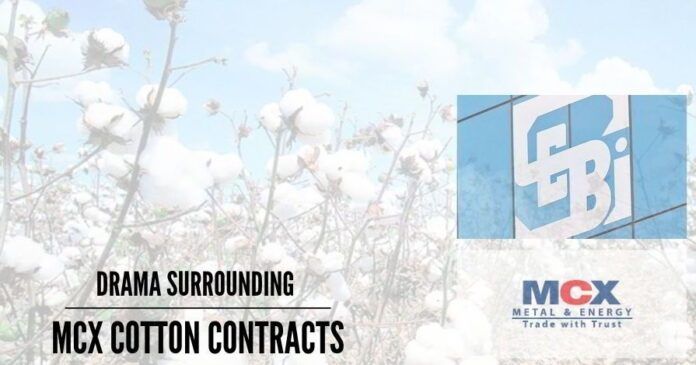
Why was the chief buyer of this large quantity of cotton bales reluctant to take delivery for months and let the goods rot in warehouses even during the monsoon season?
‘A guilty conscience needs no accuser,’ is an old adage that fits well with what recently transpired in cotton trading contracts at the Multi Commodity Exchange (MCX). Past few days saw some hectic manoeuvring at the Securities Exchange Board of India (SEBI) after PGurus published its article “How SEBI has pulled Cotton over its eyes on MCX matters[1].” Top MCX officials were seen rushing to SEBI headquarters in Mumbai (unless they were allowed inside SEBI without visitors pass) to get the mess involving cotton trading resolved.
After these hush-hush meetings it is now being declared by those closely linked to SEBI and the exchange that there was no issue with the quality of cotton bales lying in warehouses. Was it for fun that chief buyer of this large quantity of cotton bales reluctant to take delivery for months and let the goods rot in warehouses even during the monsoon season?
Both Louis Dreyfus (LD) and Glencore that traded on MCX cotton contracts have issued nearly identical clarifications to PGurus after the publication of the first article on August 28.
Remember, cotton is the most sensitive agriculture product during the monsoon season as it attracts moisture like a magnet and the quality soon starts to deteriorate. More than lakh bales of cotton lay in warehouses across Gujarat and Maharashtra even in the month of August; to the bewilderment of many the ‘Spot’ market rate of these cotton bales on MCX rose more than the ‘Futures’ price. For seasoned commodity traders, such a price variation is a tell-tale sign of ‘delivery related issue’ as it indicates that cotton bales are available but delivery is not happening. Why did SEBI, like an alert regulator, not test the samples of Cotton bales as there was a ‘quality’ scare in the market? Commodity market experts say it was frequent practice to test the quality of agricultural products under the previous regulator Forward Markets Commission (FMC) usually when price variation occurred between spot and futures prices despite the availability of delivery.
Volte face by the Complainant
A key development after PGurus article and meetings at SEBI is that a Maharashtra based buyer of large cotton bales, who had given a complaint, has backtracked and is now ready to take delivery of the entire cotton bales! Why was the Cotton trader reluctant to take delivery earlier and let his goods deteriorate in warehouses even during monsoon times? Most importantly, it is learnt that the trader had to give a written statement that there were no quality issues and he had no complaints. In the first place, why would any trader give any such undertaking at all if the trading was done in the normal course?
Funding for cotton bales is another important point in this matter. It is learnt that a Mumbai based broker, who has also been accused in the National Spot Exchange Limited (NSEL) spot exchange matter for duping clients of thousands of crores, was involved in the funding of cotton trade too. Is Portfolio Management allowed in commodity trading? Where did the Maharashtra trader who had put in more than Rs 200 crores to buy cotton bales and yet did not pick-up delivery before cotton catches moisture, get his funding from? Will the clients of the brokerage now be made to bear the losses or is the warehouse company going to pick up the cheque? Was the cotton trader, who bought large cotton bales on MCX, in Mumbai to meet key exchange officials and even visited the exchange premises? (Evidence of this can be produced). Did the exchange issue any notice to the cotton trader in the matter accusing him of price manipulation due to which he had to come rushing to Mumbai?
Both Louis Dreyfus (LD) and Glencore that traded on MCX cotton contracts have issued nearly identical clarifications to PGurus after the publication of the first article on August 28. PGurus would like to reiterate that at no point it says or attempts to say that LD or Glencore have influenced the quality of cotton bales at MCX during their trading activity this year. It is for SEBI to investigate the entire matter with regard to the trading activity of cotton bales between October 2018 and August 2019 on MCX.
On the issue of the data leak involving IGIDR professor Susan Thomas and MCX, PGurus will be making more revelations in the coming days. Watch this space.
Some questions for SEBI, MCX
- Has Manjeet Cotton now given a statement that he did not complain about the quality of cotton bales in MCX linked warehouses?
- Had Manjeet Cotton been served with a show-cause notice earlier by MCX with regard to his dealings in Cotton Contracts at MCX?
- Did key officials of Manjeet Cotton recently visit MCX headquarters in Mumbai for discussion with regard to the Cotton Trading matter?
- Is MCX aware that a Mumbai broker had funded Manjeet Cotton for cotton trading on MCX? Is portfolio management allowed in Commodity trading?
Reference:
[1] How SEBI has pulled ‘Cotton’ over its eyes on MCX matters – Aug 28, 2019, PGurus.com
- Supreme Court rejects plea to tally all VVPAT slips with EVM votes; says ‘no going back to paper ballot’ - April 26, 2024
- US report citing human rights violations is deeply biased: India - April 25, 2024
- Kotak Mahindra Bank shares tank 13%. Market Cap erodes by Rs.37,721 cr post-RBI action - April 25, 2024











[…] representing Multi Commodity Exchange (MCX) on a couple of articles that we published: 1. https://www.pgurus.com/drama-surrounding-mcx-cotton-contracts/ 2. https://www.pgurus.com/how-sebi-has-pulled-cotton-over-its-eyes-on-mcx-matters/ We do publish […]
Right from inception SEBI has a very dubious record on several fronts and a meek spectator (or forced accomplice) of corruption of the highest magnitude involving thousands of crores.
[…] post Drama surrounding MCX cotton contracts appeared first on […]
[…] after PGurus published its article “How SEBI has pulled Cotton over its eyes on MCX matters[1].” Top MCX officials were seen rushing to SEBI headquarters in Mumbai (unless they were […]
Nice job PGURUS